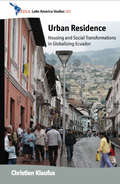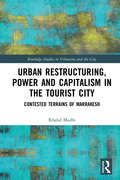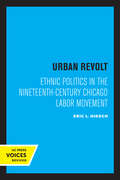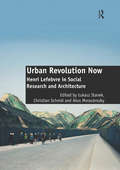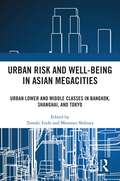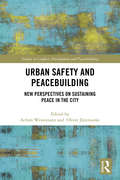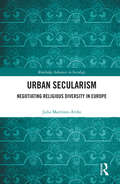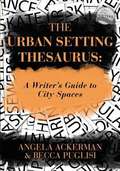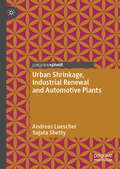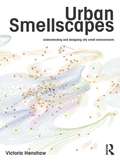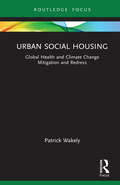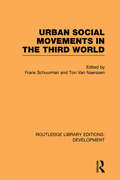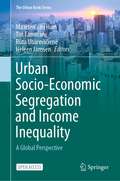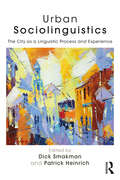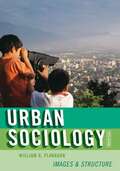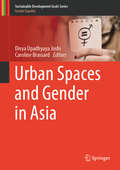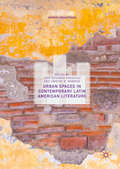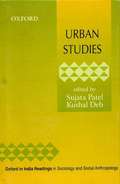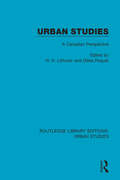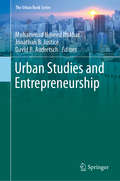- Table View
- List View
Urban Residence
by Christien KlaufusRiobamba and Cuenca, two intermediate cities in Ecuador, have become part of global networks through transnational migration, incoming remittances, tourism, and global economic connections. Their landscape is changing in several significant ways, a reflection of the social and urban transformations occurring in contemporary Ecuadorian society. Exploring the discourses and actions of two contrasting population groups, rarely studied in tandem, within these cities--popular-settlement residents and professionals in the planning and construction sector--this study analyzes how each is involved in house designs and neighborhood consolidation. Ideas, ambitions, and power relations come into play at every stage of the production and use of urban space, and as a result individual decisions about both house designs and the urban layout influence the development of the urban fabric. Knowledge about intermediate cities is crucial in order to understand current trends in the predominantly urban societies of Latin America, and this study is an example of needed interdisciplinary scholarship that contributes to the fields of urban studies, urban anthropology, sociology, and architecture.
Urban Restructuring, Power and Capitalism in the Tourist City: Contested Terrains of Marrakesh (Routledge Studies in Urbanism and the City)
by Khalid MadhiThe book focuses on the processes of urban restructuring, power relations and the political economy of touristic authenticity. Through an in-depth analysis of Marrakesh, Morroco, the book proposes a comprehensive analytic framework. It highlights the issues of (post)coloniality, ideology, heritage-commodification, subjectivity and counter-conduct in the shadow of global capitalism. It explores how power relations and political ecomomy have shaped the city of Marrakesh over the past few decades, formulating new subjectivities. It reveals how urban policy’s sole purpose is to boost tourism in the city, bringing into question the long-term resilience and success of tourism as an economic activity and a policy choice. This book considers how the well-being of city residents is submitted to such policies, conforming to certain forms of appropriation – of land, culture and memory. The example of Morocco helps us understand a phenomenon affecting many other cities internationally. This book will be valuable to academics and practitioners across disciplines, including geography, political science, urban planning and architecture.
Urban Revolt: Ethnic Politics in the Nineteenth-Century Chicago Labor Movement
by Eric L. HirschUrban Revolt is an incisive reexamination of the most highly mobilized urban revolutionary force in American history—the late nineteenth-century Chicago labor movement. By documenting the importance of ethnic origins in accounting for political choice, Eric L. Hirsch completely reconceptualizes the dynamics of urban social movements. Hirsch links the industrialization of Chicago to the development and maintenance of an ethnically segmented labor market. Urbanization, he argues, fostered ethnic enclaves whose inhabitants were channeled into particular kinds of jobs and excluded from others. Hirsch then demonstrates the political implications of emergent ethnic identities and communities. In the late nineteenth century, Chicagoans of German background—denied economic power by Anglo-Americans' control of craft unions and excluded from political influence by Irish-dominated political machines—formulated radical critiques of the status quo and devised innovative political strategies. In contrast, the Irish revolutionary movement in Chicago targeted the oppressive British political system; Irish activists saw no reason to overthrow a Chicago polity that brought them political and economic upward mobility. Urban Revolt gives a new perspective on revolutionary mobilization by de-emphasizing the importance of class consciousness, social disorganization, and bureaucracy. In his original and provocative focus on the importance of ethnicity in accounting for political choice, Hirsch makes a valuable contribution to the study of social movements, race, and working-class politics. This title is part of UC Press's Voices Revived program, which commemorates University of California Press’s mission to seek out and cultivate the brightest minds and give them voice, reach, and impact. Drawing on a backlist dating to 1893, Voices Revived makes high-quality, peer-reviewed scholarship accessible once again using print-on-demand technology. This title was originally published in 1990.
The Urban Revolution
by Henri LefebvreOriginally published in 1970, The Urban Revolution marked Henri Lefebvre’s first sustained critique of urban society, a work in which he pioneered the use of semiotic, structuralist, and poststructuralist methodologies in analyzing the development of the urban environment. Although it is widely considered a foundational book in contemporary thinking about the city, The Urban Revolution has never been translated into English—until now. This first English edition, deftly translated by Robert Bononno, makes available to a broad audience Lefebvre’s sophisticated insights into the urban dimensions of modern life.Lefebvre begins with the premise that the total urbanization of society is an inevitable process that demands of its critics new interpretive and perceptual approaches that recognize the urban as a complex field of inquiry. Dismissive of cold, modernist visions of the city, particularly those embodied by rationalist architects and urban planners like Le Corbusier, Lefebvre instead articulates the lived experiences of individual inhabitants of the city. In contrast to the ideology of urbanism and its reliance on commodification and bureaucratization—the capitalist logic of market and state—Lefebvre conceives of an urban utopia characterized by self-determination, individual creativity, and authentic social relationships.A brilliantly conceived and theoretically rigorous investigation into the realities and possibilities of urban space, The Urban Revolution remains an essential analysis of and guide to the nature of the city.Henri Lefebvre (d. 1991) was one of the most significant European thinkers of the twentieth century. His many books include The Production of Space (1991), Everyday Life in the Modern World (1994), Introduction to Modernity (1995), and Writings on Cities (1995).Robert Bononno is a full-time translator who lives in New York. His recent translations include The Singular Objects of Architecture by Jean Baudrillard and Jean Nouvel (Minnesota, 2002) and Cyberculture by Pierre Lévy (Minnesota, 2001).
Urban Revolution Now: Henri Lefebvre in Social Research and Architecture
by Christian SchmidWhen Henri Lefebvre published The Urban Revolution in 1970, he sketched a research itinerary on the emerging tendency towards planetary urbanization. Today, when this tendency has become reality, Lefebvre’s ideas on everyday life, production of space, rhythmanalysis and the right to the city are indispensable for the understanding of urbanization processes at every scale of social practice. This volume is the first to develop Lefebvre’s concepts in social research and architecture by focusing on urban conjunctures in Barcelona, Belgrade, Berlin, Budapest, Copenhagen, Dhaka, Hong Kong, London, New Orleans, Nowa Huta, Paris, Toronto, São Paulo, Sarajevo, as well as in Mexico and Switzerland. With contributions by historians and theorists of architecture and urbanism, geographers, sociologists, political and cultural scientists, Urban Revolution Now reveals the multiplicity of processes of urbanization and the variety of their patterns and actors around the globe.
Urban Risk and Well-being in Asian Mega Cities: Urban Lower and Middle Classes in Bangkok, Shanghai, and Tokyo
by Tamaki EndoRapid urbanisation presents challenges such as inequality, informalisation and diversified, social needs for emerging cities. Informal and formal institutions and their impact on urban development and wellbeing vary across social classes and cities. Endo, Shibuya, and their contributors provide a systematic and multifaceted overview of urban wellbeing. It explores the characteristics and complexities of urban wellbeing of lower and middle classes in Asian megacities. The book explains that social setting and socioeconomic condition of individuals and households play critical role in urban wellbeing. It offers insights on the vulnerabilities and resilience of urban populations and the intertwined dynamics of social networks and what they mean for individual wellbeing. A useful reference for students, researchers and academics in urban studies, Asian studies or development studies.
Urban Safety and Peacebuilding: New Perspectives on Sustaining Peace in the City (Studies in Conflict, Development and Peacebuilding)
by Achim Wennmann Oliver JütersonkeThis volume draws together original research related to conceptual and practical advances at the interface of urban safety and peacebuilding. The book reflects the advances in urban safety and peacebuilding to help address the rapidly increasing risk of conflict and insecurity in cities. Specifically, it draws on contributions to the Technical Working Group on the Confluence of Urban Safety and Peacebuilding Practice, an informal expert network co-facilitated by the United Nations Office at Geneva, UN-Habitat’s Safer Cities Programme, and the Geneva Peacebuilding Platform. A focus on ‘sustaining peace’ serves as a framework for situating new policy responses against conflict, violence, and exclusion in the city, and for promoting a conversation across disciplinary and specialist silos. The volume thereby broadens the optic of peacebuilding practice beyond interstate and intrastate armed conflicts – and especially their aftermath – and reconnects it to the community-level origins of building peace. The analysis and practice presented here will remind those willing to work towards peaceful and inclusive cities that there are tried and tested approaches available, and a host of experts and practitioners ready to accompany those prepared to lead in their respective contexts. This book will be of interest to students and researchers in the fields of peacebuilding, urban studies, security studies, and international relations.
Urban Schools and English Language Education in Late Modern China: A Critical Sociolinguistic Ethnography (Routledge Critical Studies in Multilingualism)
by Miguel Perez-MilansShortlisted for the 2014 BAAL Book Prize This book explores the meaning of modernization in contemporary Chinese education. It examines the implications of the implementation of reforms in English language education for experimental-urban schools in the People’s Republic of China. Pérez-Milans sheds light on how national, linguistic, and cultural ideologies linked to modernization are being institutionally (re)produced, legitimated, and inter-personally negotiated through everyday practice in the current context of Chinese educational reforms. He places special emphasis on those reforms regarding English language education, with respect to the economic processes of globalization that are shaping (and being shaped by) the contemporary Chinese nation-state. In particular, the book analyzes the processes of institutional categorization of the "good experimental school", the "good student", and the "appropriate knowledge" that emerge from the daily discursive organization of those schools, with special attention to the related contradictions, uncertainties and dilemmas. Thus, it provides an account of the on-going cultural processes of change faced by contemporary Chinese educational institutions under conditions of late modernity. Winner of The University of Hong Kong's Faculty Early Career Research Output Award for outstanding book publication, by the Faculty of Education
Urban Secularism: Negotiating Religious Diversity in Europe (Routledge Advances in Sociology)
by Julia Martínez-AriñoWhile French laïcité is often considered something fixed, its daily deployment is rather messy. What might we learn if we study the governance of religion from a dynamic bottom-up perspective? Using an ethnographic approach, this book examines everyday secularism in the making. How do city actors understand, frame and govern religious diversity? Which local factors play a role in those processes? In Urban Secularism: Negotiating Religious Diversity in Europe, Julia Martínez-Ariño brings the reader closer to the entrails of laïcité. She provides detailed accounts of the ways religious groups, city officials, municipal employees, secularist actors and other civil-society organisations negotiate concrete public expressions of religion.Drawing on rich empirical material, the book demonstrates that urban actors draw and (re-)produce dichotomies of inclusion and exclusion, and challenge static conceptions of laïcité and the nation. Illustrating how urban, national and international contexts interact with one another, the book provides researchers with a deeper understanding of the multilevel governance of religious diversity.
The Urban Setting Thesaurus: A Writer's Guide to City Spaces
by Angela Ackerman; Becca PuglisiMaking readers care and feel like they’re part of the story should be the number one goal for all writers. Ironically, many storytellers fail to maximize one of fiction’s most powerful elements to achieve this: the setting. Not only can the right location become a conduit for emotion, it can also provide conflict, characterize the story’s cast, reveal significant backstory, and trigger the reader’s own emotional memories through sensory details and deep point of view.
Urban Shrinkage, Industrial Renewal and Automotive Plants
by Andreas Luescher Sujata ShettyThis book focuses on the relationship between the auto industry and the built environment at multiple scales, a topic of particular interest now as the industry is going through a period of major transformation. Drawing from multiple perspectives, including architecture, urban design and urban planning, the authors examine the changing form of the auto factory itself, the changing geography of auto production, and the challenges faced by communities as the auto plants that once brought them prosperity, and often a sense of identity, leave town. They examine four places that are dealing in different ways, and with varying success, with the aftermath of a decommissioned auto plant in their midst. These are Janesville, Wisconsin, and Willow Run, Michigan, in the U.S., and Bochum, Germany, and Genk, Belgium, in Europe. Together these four cases provide some clues about what the future might look like for places that were once intimately connected with the manufacture of cars.
Urban Smellscapes: Understanding and Designing City Smell Environments
by Victoria HenshawWe see the city, we hear the city, but above all: we smell the city. Scent has unique qualities: ubiquity, persistence, and an unparalleled connection to memory, yet it has gone overlooked in discussions of sensory design. What scents shape the city? How does scent contribute to placemaking? How do we design smell environments in the city? Urban Smellscapes makes a notable contribution towards the growing body of literature on the senses and design by providing some answers to these questions and contributing towards the wider research agenda regarding how people sensually experience urban environments. It is the first of its kind in examining the role of smell specifically in contemporary experiences and perceptions of English towns and cities, highlighting the perception of urban smellscapes as inter-related with place perception, and describing odour’s contribution towards overall sense of place. With case studies from factories, breweries, urban parks, and experimental smell environments in Manchester and Grasse, Urban Smellscapes identifies processes by which urban smell environments are managed and controlled, and gives designers and city managers tools to actively use smell in their work.
Urban Social Housing: Global Health and Climate Change Mitigation and Redress
by Patrick WakelyThis book proposes operational approaches to public sector support to community-led development of urban low-income group social housing in the prevailing and medium-term. Within the context of mitigating and redressing the existential threats of climate change and global pathogenic transmission, building on current concerns of global heating and the lessons learnt from the 2020-22 COVID-19 pandemic, the book closely examines recent examples from a wide international range of countries and cities from the Sri Lanka experience to Arab States of the Middle East and the Andes. Topics include maintenance and management of public sector housing, poverty alleviation objectives, climate change mitigation, housing density, local land management and planning, land rights, affordable housing markets, and international governance and administration, ultimately pointing to the universal need for institutional, organisational and human skills development and the compilation and dissemination of operationally successful examples of participatory partnerships for affordable social housing. The book will be of interest to researchers, instructors, practitioners, and students of urban development, housing, environmental design, land-use planning, public administration and environmental health engineering.
Urban Social Movements in the Third World (Routledge Library Editions: Development)
by Frans Schuurman Ton Van NaerssenThis reissue, initially published in 1989, considers the upsurge of locally-based movements attempting to improve living conditions in Third-World cities throughout the 1980s. The book presents qualitative, comparative research on the dynamics and constraints of these urban social movements, in a cross-cultural framework, using case studies from a variety of Latin American, African and Asian countries. As more democratic-type regimes establish themselves in the Third World, the possibilities for collective organisations and actions increase. Urban social movements therefore are playing an increasingly important role in the habitat of the poor.
Urban Socio-Economic Segregation and Income Inequality: A Global Perspective (The Urban Book Series)
by Maarten Van Ham Tiit Tammaru Rūta Ubarevičienė Heleen JanssenThis open access book investigates the link between income inequality and socio-economic residential segregation in 24 large urban regions in Africa, Asia, Australia, Europe, North America, and South America. It offers a unique global overview of segregation trends based on case studies by local author teams. The book shows important global trends in segregation, and proposes a Global Segregation Thesis.Rising inequalities lead to rising levels of socio-economic segregation almost everywhere in the world. Levels of inequality and segregation are higher in cities in lower income countries, but the growth in inequality and segregation is faster in cities in high-income countries. This is causing convergence of segregation trends. Professionalisation of the workforce is leading to changing residential patterns. High-income workers are moving to city centres or to attractive coastal areas and gated communities, while poverty is increasingly suburbanising. As a result, the urban geography of inequality changes faster and is more pronounced than changes in segregation levels. Rising levels of inequality and segregation pose huge challenges for the future social sustainability of cities, as cities are no longer places of opportunities for all.
Urban Sociolinguistics: The City as a Linguistic Process and Experience
by Dick Smakman Patrick HeinrichFrom Los Angeles to Tokyo, Urban Sociolinguistics is a sociolinguistic study of twelve urban settings around the world. Building on William Labov’s famous New York Study, the authors demonstrate how language use in these areas is changing based on belief systems, behavioural norms, day-to-day rituals and linguistic practices. All chapters are written by key figures in sociolinguistics and presents the personal stories of individuals using linguistic means to go about their daily communications, in diverse sociolinguistic systems such as: extremely large urban conurbations like Cairo, Tokyo, and Mexico City smaller settings like Paris and Sydney less urbanised places such as the Western Netherlands Randstad area and Kohima in India. Providing new perspectives on crucial themes such as language choice and language contact, code-switching and mixing, language and identity, language policy and planning and social networks, this is key reading for students and researchers in the areas of multilingualism and super-diversity within sociolinguistics, applied linguistics and urban studies.
Urban Sociology
by Mark AbrahamsonThis concise yet comprehensive overview of the political and economic development of the world's cities offers a unique emphasis on its cultural impacts. The book emphasizes the transition from modern (industrial) to post-modern (post-industrial) eras and its effect on established and developing global cities, and arguments are supported with case studies for each of the main concepts of urban theory and research. Mark Abrahamson analyzes contemporary global cities - ranging from Lagos to Los Angeles, Paris to Beijing - helping students relate concepts to concrete places and understand the global nature of contemporary urban development. Rigorous yet accessible, this textbook includes key learning features designed to enrich student understanding and engagement, including chapter-by-chapter glossaries, summaries, and suggestions for further reading.
Urban Sociology: Images and Structure
by William G. FlanaganThe fifth edition of this text presents a balanced review of the ecological arguments that the urban arena produces unique experiential and urban-based cultural effects while exploring the broader political and economic contexts that produce and modify the urban environment. In addition to examining the urban dimensions of such topics as community formation and continuity, minority and majority dynamics, ethnic experience, poverty, power, and crime, it provides an analysis of the spatial distribution of population and resources with regard to the metropolitanization of the urban form, and the interaction between urban concentration and development and underdevelopment. <p><p>From a first chapter that begins with a discussion of some of the more micrological features of the urban experience, the text focuses on the significance of the more macrological cultural, social organizational, and political dimensions of urban change, in an historical span that includes the first cities and concludes with an exploration of the implications of cyberspace, transnationalism, and global terrorism for the future of urban sociology. While the work focuses primarily on the North American case, its analytical and integrated discussion makes it applicable to urban societies in general.
Urban Soundscapes: A Guide to Listening for Landscape Architecture and Urban Design
by Usue Ruiz AranaSound and listening are intrinsically linked to how we experience and engage with places and communities. This guide puts forward a new conceptual framework of embodied affectivity that emphasises listening in urban research and design and advances new ways of knowing and making. The guide invites landscape architects and urban designers to become soundscape architects and offers practical advice on sound and listening applicable to each stage of a design project: from reading the environment to intervening on it.Urban Soundscapes foregrounds listening as an affective mediator between subjects and multispecies environments, and a vehicle to think and conceptualise environmental research and design beyond prevailing visual and human-centred modes. The guide expands landscape architects’ and urban designers’ tools and skills to assess existing soundscapes, predict how those soundscapes will be altered through their designs, consider sound as a creative and active part of the design process and envisage how users might perceive and be affected by those soundscapes as they evolve in time. The volume sits in the interface of research and practice and interweaves theoretical, methodological and creative contributions from acoustic ecology, ecoacoustics, bioacoustics and sound art. Each of the design stages is illustrated through project examples that demonstrate the many advantages of incorporating attentive listening and sound into Landscape Architecture and Urban Design Practice. This book shows how incorporating listening and sounding as part of the design process promotes slow and subtle ways of practice, adds social and ecological value through the reduction of noise pollution and by monitoring the health of habitats, and enables the design of soundscapes that complement the character and design intent of a scheme and elicit joy and wonder.The book will be of interest to practitioners and academics in landscape architecture, and other design and spatial fields such as urban design, architecture, geography and engineering, who play a primary role in the composition of the soundscape.
Urban Space and National Identity in Early Twentieth Century São Paulo, Brazil: Crafting Modernity
by Cristina Peixoto-MehrtensThis book focuses on how the political, cultural, and technical networks within the field of engineering provided the space within which an important professional middle class prospered in the city of São Paulo and made lasting contributions to the development of modern Brazil.
Urban Spaces and Gender in Asia (Sustainable Development Goals Series)
by Caroline Brassard Divya Upadhyaya JoshiExploring the relationship between place and identity, this book gathers 30 papers that highlight experiences from throughout the Asia-Pacific region. The countries profiled include China, India, Japan, Indonesia, and Thailand. Readers will gain a better understanding of how urbanization is affecting gender equity in Asian-Pacific cities in the 21st century. The contributing authors examine the practical implications of urban development and link them with the broader perspective of urban ecology. They consider how visceral experiences connect with structural and discursive spheres. Further, they investigate how multiple, interconnected relations of power shape gender (in)equity in urban ecologies, and address such issues as construction of Kawaii as an idealized femininity, diversity among homosexuals in urban India, and single women and rental housing. In turn, the authors present hitherto unexplored sub-themes from historiography and existentialist literary perspectives, and share a vast range of multi-disciplinary views on issues concerning gendered dispossession due to the impact of urban policy and governance. The topics covered include socio-spatial and ethnic segregation in urban spaces; intersections of gender, race, ethnicity, nationality, religion, and caste in urban spaces; and identity-based marginalization, including that of LGBT groups. Overall, the book brings together perspectives from the humanities and the social sciences, and represents a valuable contribution to the vital theoretical and practical debates on urbanism and gender equity.
Urban Spaces in Contemporary Latin American Literature (Hispanic Urban Studies)
by José Eduardo González Timothy R. RobbinsThis collection of essays studies the depiction of contemporary urban space in twenty-first century Latin American fiction. The contributors to this volume seek to understand the characteristics that make the representation of the postmodern city in a Latin American context unique. The chapters focus on cities from a wide variety of countries in the region, highlighting the cultural and political effects of neoliberalism and globalization in the contemporary urban scene. Twenty-first century authors share an interest for images of ruins and dystopian landscapes and their view of the damaging effects of the global market in Latin America tends to be pessimistic. As the book demonstrates, however, utopian elements or “spaces of hope” can also be found in these narrations, which suggest the possibility of transforming a capitalist-dominated living space.
Urban Studies
by Kushal Deb Sujata PatelThis is a sociological study of the Indian city and urbanism. It draws from some of the most influential studies conducted on Indian cities and includes conceptual pieces on the making of the urban life in India and a thematic treatment of city life.
Urban Studies: A Canadian Perspective (Routledge Library Editions: Urban Studies)
by N. H. Lithwick and Gilles PaquetThis study, first published in 1968, was one of the first books on Canada’s urban development, bringing together the viewpoints of professionals who had studied various aspects of city growth – economic, social, geographic, political. The book demonstrates the effectiveness and potential of the cross-disciplinary approach and will prove useful to all those interested in the future of our cities.
Urban Studies and Entrepreneurship (The Urban Book Series)
by David B. Audretsch Muhammad Naveed Iftikhar Jonathan B. JusticeThis book attempts to advance critical knowledge and practices for fostering a variety of entrepreneurship at a city level. The book aims to connect scholarship and policy practice in two disciplines: Urban Studies and Entrepreneurship. The book has included contributions from developed, emerging, and developing countries. The chapters are clubbed under five main sections; I. Startups and Entrepreneurial Opportunities, II. Knowledge Spillover, III. Social and Bureaucratic Entrepreneurialism, IV. Demography and Informal Entrepreneurs V. Perspectives from Emerging and Developing Economies.In this regard, the book explores a number of questions, such as: what are the important varieties of entrepreneurship, how can they be observed and measured, and how does each variety emerge and operate under various conditions of infrastructure and opportunity? Which type(s) of entrepreneurship should a city prefer? What can cities do to stimulate desirable forms of entrepreneurship or is it more of a spontaneous phenomenon? Why do policies that enhance entrepreneurship in some contexts seem instead to promote crony capitalism and rent-seeking in other contexts? Should cities focus on growing their own entrepreneurs and entrepreneurial enterprises or on luring them from other cities and countries? How can a collective action in a city promote (or hinder) entrepreneurship? The contributions in the present volume address head-on these questions at the intersection of urban studies, economic theory, and the practicalities of economic development and urban governance, in a genuinely global range of places and applications.
